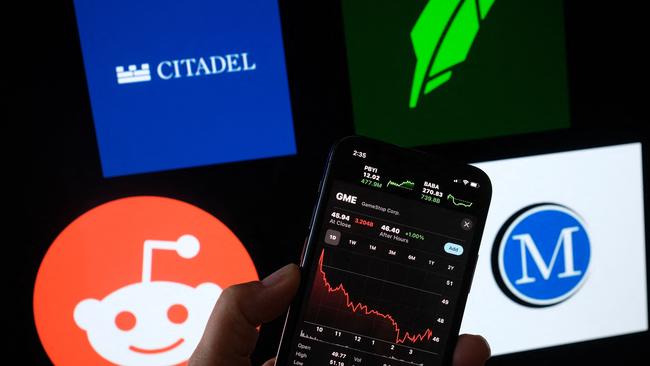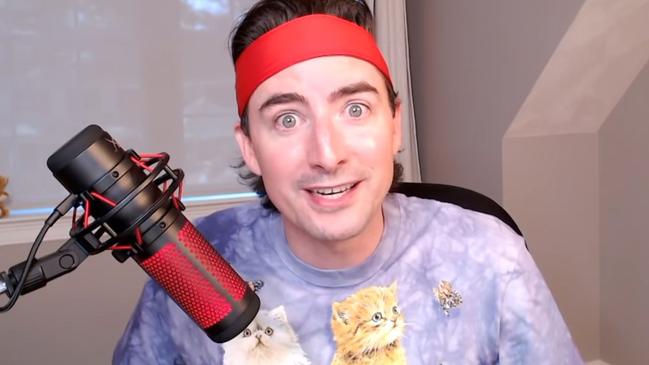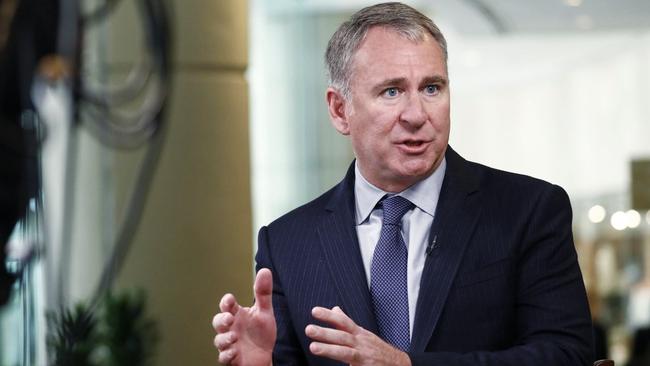Robinhood, Citadel CEOs grilled by lawmakers in wake of GameStop saga
Robinhood’s CEO has apologised for its decision to temporarily curb trading in stocks including GameStop amid wild volatility.

Robinhood Markets CEO Vlad Tenev offered an apology for the company’s decision to temporarily curb trading in some stocks, including GameStop Corp, on January 28 amid extraordinary volatility.
“Despite the unprecedented market conditions in January, at the end of the day, what happened is unacceptable to us,” Mr Tenev said after being questioned at a Congressional hearing.
His apology came after House Financial Services Committee Chairwoman Maxine Waters interrupted the Robinhood CEO during his opening remarks. Her request was unusual as witnesses are allowed to make opening statements before taking questions from lawmakers.
The GameStop episode, in which a group of online traders helped send shares of the video game retailer on a wild rally earlier this year that ultimately crashed, has raised concerns about the integrity of the US stock market and the rules that govern it.
The Securities and Exchange Commission and other authorities are investigating whether the saga calls for policy changes or was fuelled by criminal misconduct such as market manipulation.
It remains to be seen whether major policy changes are on the horizon. The hearing was billed as a fact-finding mission aimed at illuminating the GameStop drama.
In addition to Mr Tenev, lawmakers also questioned Ken Griffin, the billionaire CEO of Chicago-based hedge fund Citadel and market-making giant Citadel Securities, as well as Keith Gill, the once-anonymous trader who led the hordes of individual investors into GameStop under the online alias “Roaring Kitty.”
Mr Gill stressed in his congressional testimony that he isn’t a professional investor and doesn’t provide investment advice in exchange for fees. He also told lawmakers, “I’m not a cat.”

Lawmakers took different positions on the implications of the trading frenzy that emerged on message boards surrounding GameStop and several other popular stocks that have seen sharp rallies. Democrats focused questions for Mr Tenev on whether Robinhood’s simplified app and commission-free business model helps or hurts individual investors. Several Republicans praised the executives for helping to lower transaction costs for small traders and called for less regulation of Wall Street.
“There is an innate tension in your business model between democratising finance, which is a noble calling, and being a conduit to feed fish to sharks,” Representative Sean Casten observed.
Several Republican legislators accused their colleagues of using the hearing to push for more regulation. In his opening remarks, North Carolina’s Patrick McHenry, the top Republican on the committee, criticised prohibitions on small investors participating in private markets, where SEC disclosure rules don’t apply.
“If we’ve learned anything from the past few weeks, it’s that these average, everyday investors are pretty darn sophisticated,” Mr McHenry said.
Lawmakers from both sides of the aisle came together on the issue of whether short selling should be subject to greater regulation. Nydia Velázquez and Blaine Luetkemeyer both addressed the subject, with Ms Velázquez saying she believed short selling hurts ordinary investors and families.
Investors who have taken a stake of 5 per cent or more in a US-listed company are required to disclose their positions. Ms Velázquez asked hedge-fund manager Gabe Plotkin of Melvin Capital Management if he would support such a regulation for short selling. Mr Plotkin sidestepped the question, saying it wasn’t a matter for him to decide, “but if those are the rules, I’ll certainly abide by them.”
The Wall Street Journal reported on Wednesday that the SEC was weighing whether to require more transparency of short selling and the opaque network of stock lending and borrowing that facilitates it.

Mr Griffin also faced intense questioning related to Citadel’s paying Robinhood to execute its users’ orders. The model, known as payment for order flow, allows Robinhood to offer commission-free trading, which Mr Tenev and many Republicans say has lowered barriers to investing for people of modest means.
Democrat Brad Sherman repeatedly pressed Mr Griffin over whether Robinhood’s customers get worse execution on their trades than customers of Fidelity Investments, which doesn’t take payment for order flow on stock trades. Mr Griffin declined to answer the question directly, leading Mr Sherman to remark, “You are doing a great job of wasting my time.”
Critics say the model creates a financial incentive for Robinhood to encourage its users to trade frequently -- a strategy that few investment advisers recommend for non-professional investors.
Mr Tenev sought to deflect such criticism, saying that most of the platform’s users hold on to the stocks they buy. He said the total value of Robinhood customers’ assets exceeded the sum they deposited on the platform by more than $US35 billion.
Mr Tenev declined to reveal how much Robinhood’s clients had invested on the app. That makes it impossible to discern a rate of return on their investments, Jim Himes noted.
“You threw out the number of $US35 billion,” Mr Himes said. “I actually think the right comparison is: What if your clients had simply invested in an S&P 500 index fund? Would that number be more than $US35 billion, or less?”
Mr. Tenev responded, “Congressman, with respect, I don’t think the right comparison is investing in an S&P 500 index fund. I think the right comparison is not having invested at all and having instead spent that money.”
Wall Street Journal



To join the conversation, please log in. Don't have an account? Register
Join the conversation, you are commenting as Logout